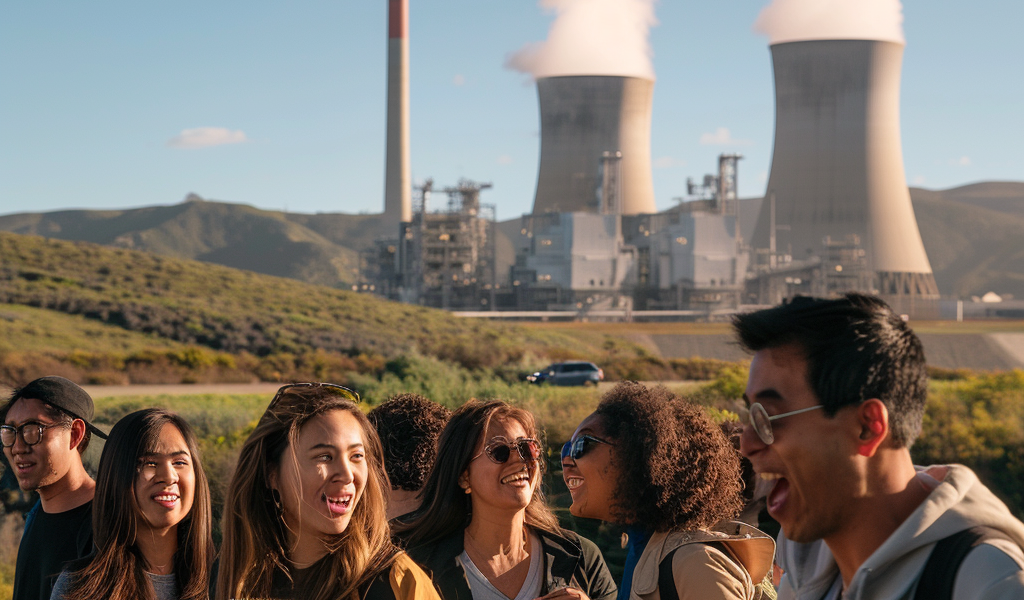As the global community grapples with the urgent need to combat climate change, nuclear power is experiencing a renaissance of support, particularly among younger generations. This shift in perception is exemplified by the story of Heather Hoff, who, after a decade of working at the Diablo Canyon Nuclear Power Plant in California, transitioned from skepticism to advocacy for nuclear energy.
Initially, Hoff joined the plant with reservations about nuclear power, even committing to report any safety concerns to the anti-nuclear organization, Mothers for Peace. However, her experiences at Diablo Canyon led her to co-found a pro-nuclear group, Mothers for Nuclear, in 2016, aimed at preserving the plant. “I was pretty nervous. It felt very lonely—no one else was doing that,” Hoff recalled, highlighting the isolation she felt in her advocacy.
Public support for nuclear energy has surged to its highest levels in over a decade, driven by a growing urgency to reduce reliance on fossil fuels that contribute to global warming. This trend is particularly pronounced among younger individuals who are less influenced by the historical nuclear disasters that shaped the perceptions of older generations. David Weisman, a long-time advocate for shutting down Diablo Canyon, noted that younger generations, including Gen Z, do not carry the same fears associated with events like Three Mile Island and Chernobyl.
Weisman remarked, “Old-school environmentalists grew up in the generation of Three Mile Island and Chernobyl. The Gen Zers today did not. They don’t remember how paralyzed with fright the nation was the week after Three Mile Island. They don’t recall the shock of Chernobyl less than seven years later.” This generational divide is contributing to a renewed interest in nuclear energy as a viable solution to climate change.
The younger advocates for nuclear energy, many of whom are active on social media platforms like X and Instagram, are optimistic that this renewed interest can catalyze a new era of nuclear power. Veronica Annala, a 23-year-old college student at Texas A&M and president of the school’s Nuclear Advocacy Resource Organization, expressed her belief that her generation is ready to embrace nuclear energy. “I think we are the generation that’s ready to make this change, and accept facts over feelings, and ready to transition to a cleaner, more reliable and safer energy source,” she stated.
Recent developments in the nuclear sector further underscore this growing momentum. Major companies like Microsoft, Amazon, and Google are investing in nuclear technology, with Microsoft announcing plans to fund the reopening of the shuttered Three Mile Island unit to power a new data center. These investments reflect a broader recognition of nuclear power’s potential role in achieving ambitious climate goals.
As the conversation around energy sources evolves, the narrative surrounding nuclear power is also changing. The increasing acceptance of nuclear energy as a clean and reliable alternative to fossil fuels is becoming more prominent, especially as the urgency to address climate change intensifies. The combination of technological advancements, changing public opinion, and the drive for sustainable energy solutions is positioning nuclear power as a critical component in the global energy landscape.
In California, the Diablo Canyon Power Plant stands as a testament to this shift. Once a focal point of controversy and opposition, it is now at the center of discussions about the future of energy in the state. The plant’s operational capacity and potential for expansion are being re-evaluated in light of California’s ambitious climate goals, which aim for significant reductions in greenhouse gas emissions.
Supporters argue that keeping Diablo Canyon operational is essential for maintaining grid reliability and meeting energy demands while transitioning to renewable sources. As the state continues to face challenges related to energy supply and climate change, the role of nuclear power is being reassessed with a focus on its potential to provide a stable and low-carbon energy source.
The dialogue surrounding nuclear energy is evolving, with advocates emphasizing its role in achieving a sustainable energy future. As younger generations take the lead in this conversation, they are challenging long-held beliefs and advocating for a comprehensive approach to energy that includes nuclear power as a key player in the fight against climate change.
In conclusion, the resurgence of interest in nuclear power reflects a broader societal shift towards recognizing the importance of diverse energy sources in addressing climate challenges. The advocacy efforts of individuals like Heather Hoff and the engagement of younger generations signal a significant change in how nuclear energy is perceived and its potential role in the future energy landscape.





